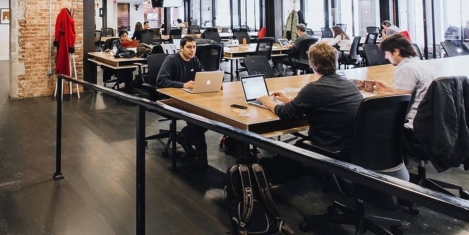September 12, 2018
A new era of technology could resolve UK low productivity at last
 A new McKinsey study sets out to address the reasons why the United Kingdom experiences chronically low productivity and what can be done to use technology to improve its performance. In the report, Solving the UK’s productivity puzzle in the digital age, the authors argue that “Britain stands out as one of the worst productivity performers among its peers”. They argue that there are four distinct reasons for the weakness since the economic crisis: “boom and bust” in the financial sector, the strength of employment growth, weak investment and uneven “digitisation”. It claims that the UK is operating at only 17 per cent of its digitisation potential, indicating how much scope for improvement there is.
A new McKinsey study sets out to address the reasons why the United Kingdom experiences chronically low productivity and what can be done to use technology to improve its performance. In the report, Solving the UK’s productivity puzzle in the digital age, the authors argue that “Britain stands out as one of the worst productivity performers among its peers”. They argue that there are four distinct reasons for the weakness since the economic crisis: “boom and bust” in the financial sector, the strength of employment growth, weak investment and uneven “digitisation”. It claims that the UK is operating at only 17 per cent of its digitisation potential, indicating how much scope for improvement there is.









 Employers need to recognise the workplace as integral to delivering a business’ commercial strategy, and treat employees as ‘workplace consumers’ – creating ‘frictionless’ experiences and environments that help them perform to their best ability. This is according to a report: ‘Optimising performance: defining, designing, maintaining and evolving workplace experiences’ from Interserve, undertaken in partnership with Advanced Workplace Associates (AWA). The two-year study into the science behind effective working environments argues there is a need to radically re-envisage workplaces to optimise team productivity and maximise the value of physical working environments. It sets out a series of critical steps for knowledge-based businesses to revolutionise the workplace – and thereby aid employee performance. The report argues that traditional silos, from IT and HR to facilities, need to be broken down to integrate the management of the workplace as part of a ‘one-team’ approach; doing so will ensure companies can deliver a streamlined workplace experience which supports employee productivity.
Employers need to recognise the workplace as integral to delivering a business’ commercial strategy, and treat employees as ‘workplace consumers’ – creating ‘frictionless’ experiences and environments that help them perform to their best ability. This is according to a report: ‘Optimising performance: defining, designing, maintaining and evolving workplace experiences’ from Interserve, undertaken in partnership with Advanced Workplace Associates (AWA). The two-year study into the science behind effective working environments argues there is a need to radically re-envisage workplaces to optimise team productivity and maximise the value of physical working environments. It sets out a series of critical steps for knowledge-based businesses to revolutionise the workplace – and thereby aid employee performance. The report argues that traditional silos, from IT and HR to facilities, need to be broken down to integrate the management of the workplace as part of a ‘one-team’ approach; doing so will ensure companies can deliver a streamlined workplace experience which supports employee productivity.








 Eight in ten workers use their personal smartphones for work purposes to make their jobs easier as almost half report wasting 10 minutes per hour in their working day due to their employers’ ineffective technology. According to the
Eight in ten workers use their personal smartphones for work purposes to make their jobs easier as almost half report wasting 10 minutes per hour in their working day due to their employers’ ineffective technology. According to the 
 A third of UK office workers (30 percent) have admitted to only completing 1-4 tasks every day, according to a new report from Fellowes, which claims productivity levels in offices across the UK have fallen to a dramatic low. A quarter of workers admit they are unproductive for up to two hours a day, equating to a staggering 40 million-hours in lost productivity across the UK every week. Compared to data from Fellowes in 2017, the average office worker has lost an extra 30 minutes each day to productivity issues., office product specialists, released their second Productivity in the UK report today to help businesses understand what their employees need to increase output and the tools that can help. The study also found that over a third (38 percent) of office workers felt their employers weren’t doing enough to help their productivity and nearly half (40 percent) even went as far as to say they were more productive than their boss. On average Brits failed to meet deadlines at least once a week and 65 percent think a four-day working week would improve productivity.
A third of UK office workers (30 percent) have admitted to only completing 1-4 tasks every day, according to a new report from Fellowes, which claims productivity levels in offices across the UK have fallen to a dramatic low. A quarter of workers admit they are unproductive for up to two hours a day, equating to a staggering 40 million-hours in lost productivity across the UK every week. Compared to data from Fellowes in 2017, the average office worker has lost an extra 30 minutes each day to productivity issues., office product specialists, released their second Productivity in the UK report today to help businesses understand what their employees need to increase output and the tools that can help. The study also found that over a third (38 percent) of office workers felt their employers weren’t doing enough to help their productivity and nearly half (40 percent) even went as far as to say they were more productive than their boss. On average Brits failed to meet deadlines at least once a week and 65 percent think a four-day working week would improve productivity.




 More than a third of employees’ waste significant chunks the working day because of difficulties retrieving valuable information, with two-fifths of businesses admitting to having no processes in place to capture, record and retrieve business communications. The research conducted by 3Gem on behalf of TeleWare, claims that 36 percent of employees have wasted a lot of the working day attempting to resolve an issue when they have forgotten valuable information. A similar number (34 percent) explained that forgetting information has led them to deal ineffectively with customers, suppliers or clients. While around a quarter have missed important deadlines (26 percent) or let their colleagues down (25 percent) due to not having the necessary information front of mind. Britain is not doing very well when it comes to workplace productivity. According to the latest G7 productivity analysis from ONS, in terms of output per hour worked, the UK scored 15.1 percent below the average for the rest of the G7 advanced economies.
More than a third of employees’ waste significant chunks the working day because of difficulties retrieving valuable information, with two-fifths of businesses admitting to having no processes in place to capture, record and retrieve business communications. The research conducted by 3Gem on behalf of TeleWare, claims that 36 percent of employees have wasted a lot of the working day attempting to resolve an issue when they have forgotten valuable information. A similar number (34 percent) explained that forgetting information has led them to deal ineffectively with customers, suppliers or clients. While around a quarter have missed important deadlines (26 percent) or let their colleagues down (25 percent) due to not having the necessary information front of mind. Britain is not doing very well when it comes to workplace productivity. According to the latest G7 productivity analysis from ONS, in terms of output per hour worked, the UK scored 15.1 percent below the average for the rest of the G7 advanced economies.








May 2, 2018
The quest for wellbeing has taken over from our search for productivity
by Mark Eltringham • Comment, Wellbeing, Workplace design
(more…)